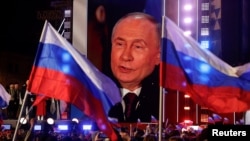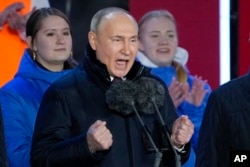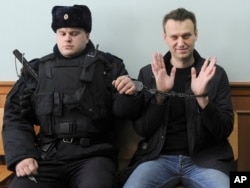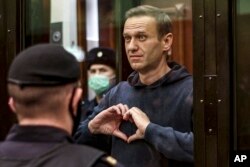On March 17, Vladimir Putin secured a new six-year term as Russia’s president following a three-day voting period that “gave voters no real alternatives due to the intimidation or jailing of most potential opponents,” VOA News reported.
U.S. Secretary of State Antony Blinken said the election “occurred in an environment of intense repression of independent voices and the imprisonment, death or exile of virtually all genuine political opposition.”
Chief among Russian opposition figures was Alexey Navalny, who died in an Arctic penal colony a month before voting got underway. Weeks before his death, Navalny had called on Russian citizens to vote for anyone but Putin.
In his victory speech, Putin mentioned Navalny by name in public for the first time in years.
Russia’s TASS state news agency quoted Putin as saying: “As far as Mr. Navalny is concerned: Well, he passed away, and this always is a sad occurrence. But there were other cases of people dying in penitentiary facilities, too."
According to TASS, after a U.S. journalist, in its words, “attempted to link Navalny’s death to the level of democracy in Russia,” Putin responded:
"People are dying in U.S. prisons, too, aren’t they?”
That is grossly misleading.
Putin’s comparison was simply an attempt to deflect attention from his systemic crackdown on dissent in Russia during more than two decades in power.
Unlike those in Russia, U.S. politicians can criticize the government and run for office, just as American citizens are free to express disagreement with the government and its policies without fearing punishment.
Still, Amnesty International and others argue that the U.S. holds several prisoners of conscience, including Toffiq al-Bihani, a 50-year-old Yemeni national who has been held at Guantanamo Bay, Cuba, since 2003 without being charged with a crime.
However, there are no reports of prisoners of conscience dying in U.S. prisons.
Navalny’s death as Russia’s high-profile political prisoner, as well as Putin’s viable domestic political opponent, is a separate issue from individuals dying in prison, particularly in its relation to gauging the level of genuine democratic participation in Russia.
Navalny rose to prominence investigating and exposing corruption among high-level Russian officials.
In January 2021, his Anti-Corruption Foundation, or FBK, released a documentary film titled “Putin’s Palace” alleging that Putin had a palace built for his personal use on Russia’s Black Sea coast. The FBK’s investigation found that the roughly $1 billion spent to build the palace came via illicit means.
The video investigation uploaded to YouTube has racked up more than 130 million views to date.
Also in 2021, Russian authorities labeled FBK an extremist organization.
Navalny ran in the 2013 Moscow mayoral election, receiving more votes than the next four candidates combined, but ultimately lost to the Kremlin-backed incumbent, Sergei Sobyanin.
In 2017, Navalny was blocked from running in Russia’s 2018 presidential election after he was convicted of embezzling from a state-owned timber company in a retrial of a 2013 case. The retrial came after the European Court of Human Rights, or ECHR, ruled that Navalny’s alleged crimes were “indistinguishable from regular commercial activity.”
Despite that ECHR ruling, a Moscow court handed down the same verdict and sentence against Navalny in the 2017 retrial that he had received in the initial prosecution.
Navalny was also convicted of “defrauding” the Russian subsidiary of French cosmetics giant Yves Rocher and received a 3½-year suspended sentence.
In 2017, the ECHR ruled that Navalny’s conviction in the Yves Rocher case was "arbitrary and manifestly unreasonable.”
But the suspended sentence Navalny received in that prosecution would later result in his imprisonment.
In August 2020, Navalny was poisoned with the military-grade nerve agent Novichok while traveling in Tomsk, Russia. An investigation jointly conducted by U.K.-based investigative website Bellingcat and Russia’s investigative website The Insider, in cooperation with Germany’s Der Spiegel and CNN, uncovered “voluminous telecom and travel data” implicating Russia’s Federal Security Service, or FSB, in the poisoning of Navalny.
Navalny was airlifted to Germany for treatment on August 22, 2020, while still in a coma. German officials said there was “unequivocal proof” Navalny was poisoned with Novichok, a conclusion backed up by French and Swiss labs, as well as the Organization for the Prohibition of Chemical Weapons.
Novichok was also used in the 2018 poisoning of ex-Russian spy Sergei Skripal and his daughter Yulia in Salisbury, England. Another Putin critic, former FSB spy Alexander Litvinenko, was killed in the U.K. in 2006 after drinking tea that had been poisoned with a radioactive isotope. In 2021, the ECHR ruled that Russia was responsible for Litvinenko's death.
Another Kremlin critic imprisoned in Russia, Vladimir Kara-Murza, twice suffered symptoms consistent with poisoning.
Investigative reporters from Bellingcat, The Insider and Der Spiegel determined that known members of the same FSB poison squad implicated in the Novichok attack on Navalny had followed Kara-Murza before his alleged poisonings in 2015 and 2017.
Kara-Murza, citing that investigation, said some of the FSB officers who followed him had also followed opposition politician Boris Nemtsov, who was shot to death on a bridge near Red Square in Moscow in February 2015.
However, the investigators noted there “is no data that links the FSB to Nemtsov’s murder.”
Upon returning to Russia in January 2021, Navalny was detained at passport control over alleged parole violations in the Yves Rocher case.
Russian authorities claimed Navalny had violated his parole conditions by failing to report to the probation service between August 2020 and January 2021. While in court, Navalny countered that he had followed the conditions of his parole up until he fell into a coma, and he sent notifications of his whereabouts after regaining consciousness.
Still, in February 2021, a Russian court sentenced Navalny to 2½ years in prison. In March 2022, Navalny was given an additional nine-year sentence for fraud over allegations he stole from the FBK.
In August 2023, he was sentenced to an additional 19 years in prison on extremism charges allegedly related to his work through the FBK and for “rehabilitating Nazi ideology.”
The former head of Navalny's office in Russia’s northern Arkhangelsk region, Ruslan Akhmetshin, also served time in prison for “rehabilitating Nazi ideology” after he correctly stated that the Soviet Union and Nazi Germany had been allied from 1939 to 1941 and jointly started World War II.
Health problems dogged Navalny while in prison. In March 2021, he launched a hunger strike, demanding appropriate medical care.
In April 2023, Navalny’s spokesperson said he was struggling with stomach issues, claiming that he was slowly being poisoned in prison.
When Navalny died on February 16, 2024, authorities held his body for more than a week before returning it to his family. A state post-mortem said he died of natural causes, while Navalny’s team accused Russian authorities of covering up his murder.
Navalny’s wife accused Russian authorities of holding the body until traces of Novichok disappeared, although no evidence has been presented backing that claim.
Mediazona, an exiled Russian news site based in Europe, wrote: “The precise reasons for Navalny’s death are unclear. The state-run RT channel attributed it to a ‘detached blood clot,’ a cause frequently mentioned in prisoners’ death certificates when there’s no intent to investigate further, as noted by human rights advocate Anna Karetnikova.”
No independent autopsy or investigation into the cause of Navalny’s death was conducted.
Putin also said he had considered exchanging Navalny in a prisoner swap with Western countries. Navalny’s spokeswoman said there had been a plan to exchange Navalny and two American citizens for Vadim Krasikov, who was sentenced to life in prison in Germany for killing Zelimkhan “Tornike” Khangoshvili, a Georgian citizen of Chechen descent who had served as a field commander in the Second Chechen War and more recently helped organize resistance in the Russia-occupied territories of Ukraine.
German judges said Krasikov carried out the killing on orders from the Russian state.
Although Navalny’s spokeswoman did not name the two American citizens who were to be exchanged, several are in Russian custody, including Paul Whelan and Wall Street Journal reporter Evan Gershkovich, both of whom were convicted of espionage, despite a lack of evidence.
The United States maintains that Whelan and Gershkovich were wrongfully detained and refers to them as hostages.









